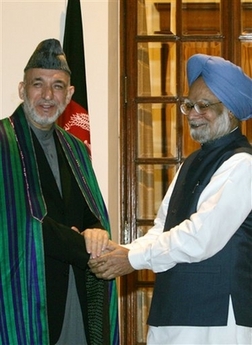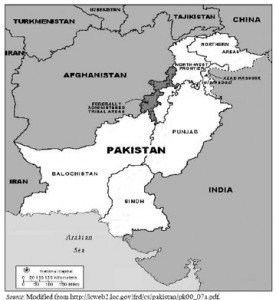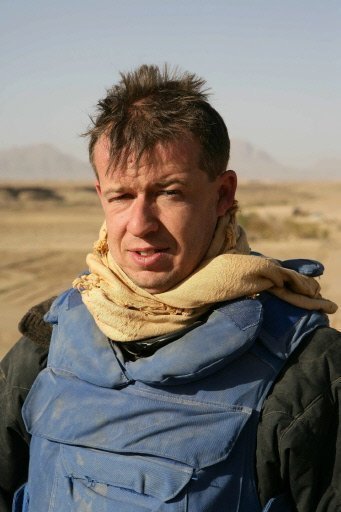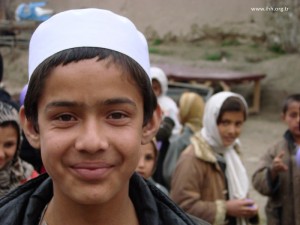 Tribal legends claim that in the foothills of the Afghan mountains, Cain (Qabil), an arable farmer, committed the first murder by killing his brother Abel (Habil), the shepherd. Cain and Abel have long been understood as the first and second sons of Adam and Eve in the religions of Judaism, Islam, and Christianity. Their story is told in the Bible and Torah at Genesis 4:1-16 and the Qur’an at 5:26-32. Although their story is cited in the Quran, neither of them is mentioned by name.
Tribal legends claim that in the foothills of the Afghan mountains, Cain (Qabil), an arable farmer, committed the first murder by killing his brother Abel (Habil), the shepherd. Cain and Abel have long been understood as the first and second sons of Adam and Eve in the religions of Judaism, Islam, and Christianity. Their story is told in the Bible and Torah at Genesis 4:1-16 and the Qur’an at 5:26-32. Although their story is cited in the Quran, neither of them is mentioned by name.
In present-day Afghanistan, this story comes to life in a figurative sense: Cain, the poppy-growing farmer, continues to kill Abel, the shepherd who lives in the mountains. Even leaving myths and fables side, sons of Afghanistan have been killing each other, albeit with external assistance, for thirty years.
But things may change for better—or worse—on Thursday, when Afghanistan holds its second democratic presidential election; its first democratic election in 2004 yielded Hamid Karzai as president. In preparation for this historical event, President Barack Obama has ordered 17,000 US troops to Afghanistan since assuming the office of President in January 2009. Obama had hoped to head off as much insurgence as possible before the election, thereby assuring a mostly peaceful vote that can be viewed as legitimate, both by Afghans and the international community.
The likelihood of a nonviolent Afghanistan on August 20 seems a bit much to ask for. The Taliban has already promised forceful opposition to the election, threatening to cut off the ink-stained fingers of those who cast their votes. Taliban leaders across Afghanistan have asked true followers of Islam to boycott the election, and foreign and local troops alike are ramping up security around polling centers in anticipation of potential unrest. However, the possibility remains that Taliban threats will keep people away from the polls on Thursday, and this eventuality could mean problems for Afghanistan in the future.
This election is critical not only for Afghanistan but for all stakeholders including the United States, Pakistan, India, and Iran; and not for the same reason. One cannot be certain that this election will optimize governance model or reduce corruption or for that matter enhance security posture: all inter-related variables, all necessary for a stable Afghanistan.
Our friend at Carnegie Council Mr. David Speedie who has just released four policy papers on Afghanistan points out that “the U.S./NATO and Russia have clear and urgent common interests in promoting long-term stability in Afghanistan, yet cooperation between Russia and the West is “episodic,” rather than strategic or systematic.” Speedie advises us to look at Afghanistan in the broader context of Central Asia and feels that current challenges facing NATO may render it “obsolete in its present form.”
 For Pakistan this election is critical because it will determine how Afghanistan is positioned in the geo-political landscape. First of all, if Afghanistan is decoupled from its South Asian neighbor and aligned with Central Asian states, Pakistan will loose leverage. But an unstable Afghanistan, the status quo, is detrimental for Pakistan as well. Secondly, if Afghanistan continues to develop deeper ties with India it will create imbalances in the region. It is no secret or exaggeration that India’s growing influence in Afghanistan comes at the expense of Pakistan’s interest. Exploiting the post 9/11 situation and piggy backing on the US invasion, India has accelerated its own presence and influence in Afghanistan. Outcome of the election will determine which direction this tide will turn.
For Pakistan this election is critical because it will determine how Afghanistan is positioned in the geo-political landscape. First of all, if Afghanistan is decoupled from its South Asian neighbor and aligned with Central Asian states, Pakistan will loose leverage. But an unstable Afghanistan, the status quo, is detrimental for Pakistan as well. Secondly, if Afghanistan continues to develop deeper ties with India it will create imbalances in the region. It is no secret or exaggeration that India’s growing influence in Afghanistan comes at the expense of Pakistan’s interest. Exploiting the post 9/11 situation and piggy backing on the US invasion, India has accelerated its own presence and influence in Afghanistan. Outcome of the election will determine which direction this tide will turn.
In an August 13 question-and-answer session, Karin von Hippel, codirector of the Post-Conflict Reconstruction Project at Washington D.C.’s Center for Strategic and International Studies, responded to questions about the fate of Afghanistan in the face of these elections. When asked about the possible outcomes of voting, von Hippel described a few different scenarios, the first being that incumbent Hamid Karzai would win by a small percentage over 50%, which is what he needs to win without a runoff with another opponent. Von Hippel thinks this will most likely create the least amount of instability, since any large margin of victory for Karzai might cause “accusations of fraud, public challenges by competing candidates, and potentially widespread violence in the north and in Kabul where many Tajiks live.”
Another possible development involves a runoff, most likely between Karzai and Abdullah Abdullah, a half-Tajik, half-Pashtun doctor who is widely considered to be Karzai’s biggest competition. This situation might also lead to hostility, since a strong Taliban presence in majority Pashtun districts might lead to a low voter turnout in areas where Karzai, an ethnic Pashtun, has the biggest following. In the case of a runoff, most polls predict a win for Karzai.
Whatever the outcome of the election, von Hippel feels “the results will be considered a positive step for Afghanistan if they are perceived as mostly free and fair,” although at the moment a free and fair outcome does not seem highly probable. In Kabul on August 17, Abdullah told a crowd of supporters that his victory was ensured, as long as the election was fair and no fraud was committed. In a country like Afghanistan where tension runs high and a governmental shift could mean the difference between life and death for many people, these statements are highly inflammatory. In fact, some fear that Abdullah’s talk of election fraud will cause his supporters to riot if he does not emerge victorious.
To be fair, Abdullah’s allegation of fraud is not the mere blathering of a man desperate for power. Indeed, there have been rumblings of discontent with the voting process from many corners over the past few weeks. In addition to the discovery of thousands of fake voter registration cards across the country, as many as 700 of 7,000 planned polling locations are expected to be shut down due to violence, particularly in Taliban strongholds in the south. If this is the case, it is no wonder many cannot bring themselves to hope for a truly democratic election.
Karzai and Abdullah have stolen much of the international media spotlight aimed at Afghanistan in the weeks preceding the election, but there are in fact two other contenders who are seen as potential dark horses in the upcoming race. Ramazan Bashardost, an ethnic Hazara with a formidable education, is making headway in the election, gaining approval as an outspoken opponent of the current corruption and abuse of power that exists in Afghanistan’s government.
Ashraf Ghani, an ethnic Pashtun and respected scholar, is a former Afghan finance minister and World Bank senior analyst. Ghani enjoys a great deal of popularity on the international level as a result of his thoughts on state building, and his campaign has focused on terminating governmental corruption in Afghanistan and developing a strong infrastructure for Afghanistan.
Neither Bashardos nor Ghani are expected to win a large amount of votes on Thursday, but their presence in the election is vital, if only as obstacles to a runoff-free win for Karzai.
Regardless of outcome, Thursday’s elections will be a huge milestone for Afghanistan, and an event that will determine not only its president, but also the outlook for the future.
India is already hoping for a Karzai win: President Karzai who studied in Indian University and has enjoyed living there during his youth fully embraced India in his last term. India is looking for access to the energy-rich Central Asian states like Turkmenistan and Kazakhstan and views Kabul as a gateway. India is also eager to neutralize Pakistan’s influence. But India that has historically supported Northern Alliance, Rasheed Dostum and other anti-Pushtoon elements is bound to change the eco-system of the region. Even after US leaves, Afghanistan will have to deal with this regional hegemony.







 Tribal legends claim that in the foothills of the Afghan mountains, Cain (Qabil), an arable farmer, committed the first murder by killing his brother Abel (Habil), the shepherd. Cain and Abel have long been understood as the first and second sons of Adam and Eve in the religions of Judaism, Islam, and Christianity. Their story is told in the Bible and Torah at Genesis 4:1-16 and the Qur’an at 5:26-32. Although their story is cited in the Quran, neither of them is mentioned by name.
Tribal legends claim that in the foothills of the Afghan mountains, Cain (Qabil), an arable farmer, committed the first murder by killing his brother Abel (Habil), the shepherd. Cain and Abel have long been understood as the first and second sons of Adam and Eve in the religions of Judaism, Islam, and Christianity. Their story is told in the Bible and Torah at Genesis 4:1-16 and the Qur’an at 5:26-32. Although their story is cited in the Quran, neither of them is mentioned by name. For Pakistan this election is critical because it will determine how Afghanistan is positioned in the geo-political landscape. First of all, if Afghanistan is decoupled from its South Asian neighbor and aligned with Central Asian states, Pakistan will loose leverage. But an unstable Afghanistan, the status quo, is detrimental for Pakistan as well. Secondly, if Afghanistan continues to develop deeper ties with India it will create imbalances in the region. It is no secret or exaggeration that India’s growing influence in Afghanistan comes at the expense of Pakistan’s interest. Exploiting the post 9/11 situation and piggy backing on the US invasion, India has accelerated its own presence and influence in Afghanistan. Outcome of the election will determine which direction this tide will turn.
For Pakistan this election is critical because it will determine how Afghanistan is positioned in the geo-political landscape. First of all, if Afghanistan is decoupled from its South Asian neighbor and aligned with Central Asian states, Pakistan will loose leverage. But an unstable Afghanistan, the status quo, is detrimental for Pakistan as well. Secondly, if Afghanistan continues to develop deeper ties with India it will create imbalances in the region. It is no secret or exaggeration that India’s growing influence in Afghanistan comes at the expense of Pakistan’s interest. Exploiting the post 9/11 situation and piggy backing on the US invasion, India has accelerated its own presence and influence in Afghanistan. Outcome of the election will determine which direction this tide will turn.
 “After eight years of US involvement in Afghanistan, a strategic crossroads within Asia, the country remains a deadly conflict zone. In fact, this weekend insurgents attacked two US military bases along the Pakistani border. Helping Afghanistan stand on its own – an imperative for both regional and Western states – is a task that will take decades. But it is increasingly clear that it is not one that the West can perform….
“After eight years of US involvement in Afghanistan, a strategic crossroads within Asia, the country remains a deadly conflict zone. In fact, this weekend insurgents attacked two US military bases along the Pakistani border. Helping Afghanistan stand on its own – an imperative for both regional and Western states – is a task that will take decades. But it is increasingly clear that it is not one that the West can perform….





